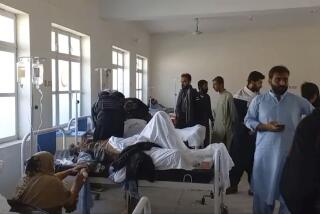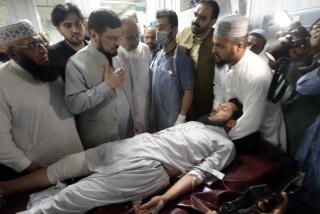Pakistani militant groups out in the open
- Share via
Reporting from Karachi, Pakistan — The leader of Jaish-e-Muhammad, one of Pakistan’s most feared militant groups, recently drew hundreds of worshipers to the Batha Mosque, where the theme of speeches and sermons often covers the same topic: holy war against the West.
Young men streamed into the beige building in north Karachi chanting “God is great!” on the day Maulana Masood Azhar spoke. Though Jaish-e-Muhammad has been banned in Pakistan since 2002, local police officers joined mosque guards in cordoning off the garbage-strewn dirt lanes surrounding the mosque and providing security for the rally.
“They had metal detectors checking people going in,” said Ali Khan, 27, who works at a barber shop about 50 yards from the mosque’s white iron gate. “The people in this mosque, their main focus is jihad.”
Jaish-e-Muhammad is being scrutinized by U.S. and Pakistani investigators for a possible connection to Faisal Shahzad, the 30-year-old Pakistani-American accused of attempting to detonate a car bomb last week in New York City’s Times Square.
Pakistani authorities arrested at least four suspected Jaish-e-Muhammad members in Karachi this week, including Mohammed Rehan, who in July allegedly drove Shahzad to the northwestern city of Peshawar, the gateway to the country’s Taliban-filled tribal areas.
In light of the Shahzad case, the U.S. probably will push Pakistan to clamp down on groups such as Jaish-e-Muhammad that harbor bitter hatred for the United States and have begun to establish links with Al Qaeda and the Pakistani Taliban. Pakistan’s record in enforcing its ban on militant groups has been poor, Pakistani analysts said.
In Karachi, banned militant groups routinely dispatch workers to mosques where they have strong followings to pass out jihad pamphlets and compact discs, said Raza Hassan, a Karachi-based crime reporter for Dawn, a Pakistani English-language newspaper.
“Authorities have not come down hard on Jaish-e-Muhammad or any of these banned outfits,” Hassan said. “They seem to lack a policy.”
If there has been a policy, it has been one that publicly condemns certain militant groups while discreetly allowing them to function under the radar. To facilitate their operations, some extremist organizations have created humanitarian front groups with different names that raise funds for building schools and healthcare clinics. What’s not known is how much of that money gets channeled to militant activities.
“Usually when the government bans these militant groups, they suddenly start welfare work,” said Yusuf Khan, a Karachi-based analyst. “During the earthquake in Kashmir in 2005, Jaish-e-Muhammad began helping people and rebuilding. That’s their technique: to become philanthropic and get sympathy.”
One reason groups such as Jaish-e-Muhammad are allowed to operate is because historically they have set their primary target as India, Pakistan’s nuclear-armed rival, experts said.
Lashkar-e-Taiba, the militant group alleged to have engineered the 2008 attacks in Mumbai that killed 166 people, is banned in Pakistan but continues to operate under the banner of Jamaat-ud-Dawa, which runs hospitals and schools throughout the country. Though the West regards Lashkar-e-Taiba as a terrorist organization, the group’s founder, Hafiz Saeed, moves freely through Pakistan and periodically delivers sermons at a mosque in Lahore.
U.S. officials and others in the West worry that Jaish-e-Muhammad and Lashkar-e-Taiba may be operating training compounds in Pakistan’s volatile tribal belt along the Afghan border. Experts doubt that the Shahzad case will prod Pakistani authorities to crack down on those groups.
“I’m afraid it will be life as normal,” said Yusuf Khan. “There is a lot of sympathy among many in law enforcement for these people. You cannot wipe this out.”
It is widely believed that Pakistan’s intelligence community helped form Jaish-e-Muhammad in the mid-1990s to battle Indian forces in the Indian-administered section of Kashmir. Later, however, the group widened its mission, training thousands of recruits to fight U.S. and NATO forces in Afghanistan. Jaish-e-Muhammad is also linked to the 2002 kidnapping and killing of Wall Street Journal correspondent Daniel Pearl.
Jaish-e-Muhammad’s leader, Azhar, lives in Bahawalpur, a southern Punjab city and the militant group’s home base. When he comes to Karachi, he usually heads to the North Nazimabad neighborhood, where he makes periodic appearances at the Batha Mosque, Ali Khan and other residents said.
Shopkeepers and neighbors near the mosque’s 10-foot perimeter wall said they tolerate a nervous co-existence with the mosque.
“We’re always fearful that something’s going to happen there,” says Shahzad Ali, a 35-year-old grocery shop owner, “and that in the process, we’ll become victims.”
More to Read
Sign up for Essential California
The most important California stories and recommendations in your inbox every morning.
You may occasionally receive promotional content from the Los Angeles Times.










